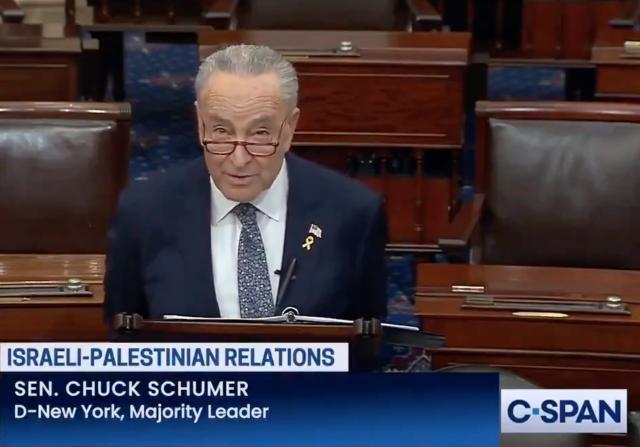In a dramatic pivot that has stirred both controversy and debate, Senator Chuck Schumer, once a staunch opponent of the Iran nuclear deal and a vocal critic of policies perceived as adversarial to Israel, now appears to align more closely with positions that critics argue favor Hamas.
This shift is particularly striking given Schumer's influential role as a Jewish voice in Congress, a distinction highlighted by major publications such as The New York Times. Schumer's transformation is not merely a political recalibration but signals a deeper realignment within the Democratic Party, increasingly seen as accommodating its progressive wing at the expense of long-standing foreign policy stances.
Quite shocking for @SenSchumer to equate @IsraeliPM @netanyahu with Hamas as a reason there is no peace between Israel and the Palestinians.
— Jason D. Greenblatt (@GreenblattJD) March 14, 2024
Quite shocking for Senator Schumer to call for the replacement of the government of Israel.
This is about the most absurd set of comments I… pic.twitter.com/LbbOiUhWV2
The implications of Schumer's stance are profound, not least for its potential impact on U.S.-Israel relations. Historically, Schumer has been celebrated as a "guardian" of Israel, making his recent rhetoric, which some interpret as echoing Hamas' narratives, a notable departure from his previous positions. This rhetorical shift comes at a critical juncture for Israel, a nation that finds itself grappling with existential threats on multiple fronts, not least from Hamas, an organization unequivocally recognized as a terrorist group by the United States and its allies for its relentless attacks against Israeli civilians.
Schumer's commentary, suggesting a reevaluation of Israel's leadership and strategies, particularly in the context of the Gaza conflict, raises significant questions about the balance between legitimate defense measures and the humanitarian implications of military actions. While Schumer critiques the Israeli government's approach, particularly under Prime Minister Benjamin Netanyahu, it's essential to contextualize the complex dynamics at play. Israel's military actions, often framed as disproportionate by critics, are responses to unprovoked aggression from Hamas, highlighting the challenges faced by democracies in countering non-state actors who embed military operations within civilian populations.
Chuck Schumer goes crazy on the Senate floor and calls for the removal of Israel's PM Netanyahu.
— Mossad Commentary (@MOSSADil) March 14, 2024
We call for the immediate removal of Schumer. pic.twitter.com/WduKmLyf3Q
The Senator's pivot reflects broader trends within the Democratic Party, where a vocal faction advocates for a reassessment of the U.S.-Israel partnership. This internal party dynamic contrasts sharply with the broader American public's support for Israel, which remains robust, underscoring a disconnect between certain political narratives and the electorate's views.
Furthermore, Schumer's evolution underscores the intricate dance of domestic politics, where global affairs are increasingly intertwined with party ideologies and the push-pull of internal factions. His stance, whether seen as a principled stand or political expediency, encapsulates the challenges facing leaders navigating the tightrope of national interest, party loyalty, and the shifting sands of public opinion.
Schumer gives aid and comfort to Iranian terrorist regime. Dumb bastard.https://t.co/n38D8mavdT
— Mark R. Levin (@marklevinshow) March 14, 2024
As debates unfold, the core issue remains the pursuit of peace and stability in a region fraught with historic tensions and contemporary challenges. The discourse around Schumer's positions invites a broader reflection on the path forward for U.S.-Israel relations, the role of leadership in times of crisis, and the imperative of supporting allies while engaging in constructive critique aimed at fostering enduring peace and security.


